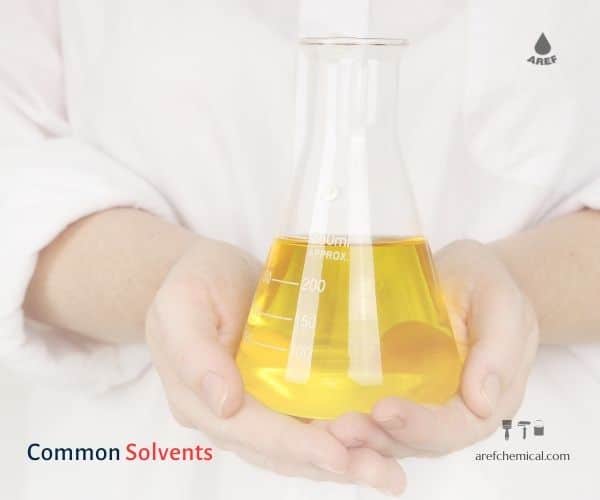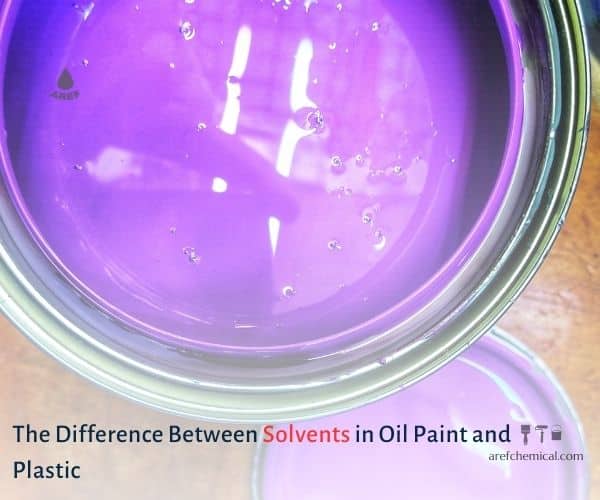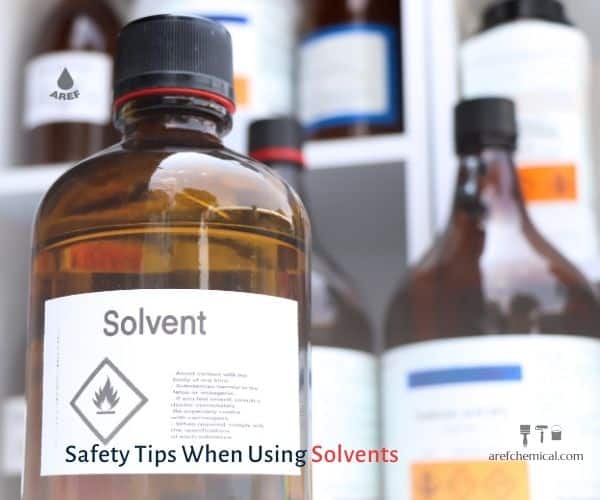Solvents, their use, and importance in all industries
Solvents, efficient and helpful molecules, are intertwined in the fabric of our daily lives and play an indispensable role in a wide range of activities. A solvent is used to dissolve or clean other substances. From removing stains on our clothes to creating pleasant scents and flavors in food, the remarkable footprint of these compounds can be found in every corner of life. Solvents can dissolve other substances, but how do they work? What are the different types of solvents and what are their uses? In this article, we aim to explore the role of solvents in daily life. We will first discuss the precise definition of a solvent and its types and then delve into their uses in various industries and in household and everyday life.
Solvents: the eternal friend of human
In summary, solvents are substances that can dissolve and bring other substances into solution. This process, known as dissolution, occurs when solvent molecules surround and interact with solute molecules through weak molecular attractions such as hydrogen bonding or van der Waals forces.
Solvents are divided into two main categories based on their solubility: polar and nonpolar solvents. Polar solvents, such as water, form hydrogen bonds with polar molecules that have partial positive and negative charges, and are adept at dissolving substances like salt and sugar that are polar. In contrast, nonpolar solvents, such as benzene, form weak van der Waals bonds with nonpolar molecules that do not have a net charge, and excel at dissolving fats and oils that are nonpolar. Or for a better understanding, one can classify them in this way.
Polar solvents: These solvents form hydrogen bonds with polar molecules that have partial positive and negative charges. Water, alcohol, and acetone are examples of polar solvents.
Non-polar solvents: These solvents form weak van der Waals bonds with non-polar molecules that have no net charge. Oil, gasoline, and hexane are examples of non-polar solvents.
Types of solvents
Solvents have a diverse and widely used world based on their application and chemical structure. In the following, we mention some of the most common types of solvents and their uses in daily life:
- Water: the most abundant solvent in nature, the basis of life, and an essential factor for the dissolution of a wide range of substances such as minerals, sugars, and proteins. Water is used in cooking, washing, agriculture, and various industries.
- Acetone: a strong and volatile solvent that is used in nail polish remover, paint thinner, and some industrial uses.
- Petroleum compounds: Solvents such as gasoline, kerosene, and toluene are used in engines, dry cleaners, and paint thinners.
- Industrial solvents: a wide range of specialized solvents such as acetonitrile, ethyl acetate, and hexane are used in various industries, including pharmaceuticals, RAL COLOR and resin production, and metal refining.
- Hydrocarbon solvents: These solvents are composed of hydrogen and carbon molecules and include things like gasoline, kerosene, and toluene. Hydrocarbon solvents are non-polar and suitable for dissolving fats and oils.
- Chlorinated solvents: These solvents are composed of hydrocarbon molecules with chlorine atoms and include things like chloroform and tetrachloroethylene. Chlorinated solvents are often used for cleaning metal parts and degreasing.
- Alcoholic solvents: These solvents are composed of alcohol molecules and include things like ethanol, methanol, and isopropanol. Alcoholic solvents are polar and are suitable for dissolving various substances such as primary colors, resins, and drugs. Ethanol is the most common type of alcohol used as a solvent in beverages, disinfectants, perfumes, and medicines. Methanol is another type of alcohol used in cleaners and antifreeze.
- Ketone solvents: These solvents are composed of ketone molecules and include things like acetone and methyl ethyl ketone. Ketone solvents are polar and are suitable for dissolving nail polish, glue and resins.
Application of solvents in different industries
Solvents are widely used in various industries. Some of their most important uses are:
- Paint and resin industry: Solvents are used in the production of paints, resins and varnishes as diluents and carriers of ingredients.
- Pharmaceutical industry: In the production of medicines, food supplements, and cosmetics, they are used as carriers of active ingredients and help in their absorption.
- Food industry: Solvents are used in the extraction of oils from vegetable seeds, the production of extracts and flavorings, as well as in food purification processes.
- Textile industry: Solvents are used in fabric dyeing and printing, fiber cleaning, and textile finishing.
- Printing industry: Solvents are used in the production of printing ink, cleaning of printing machines ,and recycling of printing materials.
In various industries, the use of solvents is quite evident and very important.
Application of solvents at home and in daily life
This substance plays a vital role in many aspects of our daily life. In the following, we mention several of the most important applications of their solvents:
- Cleaning: Solvents are used in detergents, cleaners, and soaps to remove grease, oil, paint, and other contaminants from various surfaces such as glass, metal, wood, and plastic.
- Cooking: Solvents are used in the preparation of sauces, extracts, and flavorings. Alcohol is also used as a solvent in alcoholic beverages.
- Pharmaceuticals: Many drugs are available as solutions in solvents such as water, alcohol, or glycerin.
- Cosmetics: Solvents are used in the production of perfumes, creams, lotions, and other cosmetic products.
- Industry: Solvents are widely used in various industries, such as paint based on ral, resin, textile, rubber, and pharmaceuticals.
- Diluting the paint: Solvents are used to dilute the paint and adjust the concentration of the paint.
Examples of common solvents and applications
In the following, we mention some common solvents and their uses:
- Water: the most common solvent in nature and the solvent of many mineral and organic substances. It is used for cooking, drinking, cleaning, and industrial purposes.
- Alcohol: It is a strong solvent for dissolving organic substances such as fats, oils, and resins. It is used in disinfectants, alcoholic beverages, cleaners, and medicinal uses.
- Stone: This word is very familiar to women. It is a strong solvent to dissolve nail polish, paint, and fat.
- Gasoline: This strong solvent is used to dissolve fats and oils. It is used in car engines and cleaners.
- Thinner: It is a strong solvent for dissolving paint, oil, and resin.
- Acetonitrile: It is a strong solvent for dissolving plastics and resins.
The role of solvents in oil paint and plastic
Solvents play different roles in oil and plastic paints, which we will examine below:
Oil colored
Diluting the paint: Solvents such as thinner and white spirits are used to dilute the oil paint and adjust its concentration to the desired level. This makes the paint spread easily on the surface and prevents it from being wrong and uneven.
Cleaning tools: Solvents are used to remove oil paint from brushes, rollers, and other painting tools.
Surface washing: Solvents are used to wash surfaces before painting and also to remove paint stains from painted surfaces.
plastic color
Thinning the paint: Plastic paints generally do not need to be thinned with solvents because they are water-based. However, in some cases, a small amount of water may be used to slightly dilute the paint or adjust its concentration.
Tool Cleaning: Water is used to remove plastic paint from brushes, rollers, and other painting tools.
Surface washing: Surfaces must be washed with clean water before painting with plastic paint to remove any dust and dirt.
The difference between solvents in oil paint and plastic
Solvents used in oil paint and plastic are different from each other due to the difference like these two types of paint:
Oil paint: Oil paint solvents are mainly petroleum derivatives such as thinner, white spirit, and gasoline. These solvents are strong and can dissolve oil paint well.
Plastic paint: The solvent for plastic paint is water. Because plastic colors are water-based, there is no need to use strong chemical solvents.
In the end, it should be noted that choosing the right solvent for each type of paint depends on the type of paint, the surface to be painted, and environmental conditions.
The role of solvents in innovation and development
In addition to everyday applications, solvents play an important role in innovation and progress in various fields. For example, in the pharmaceutical industry, solvents are used to dissolve drugs and prepare injectable, oral, and topical medications. In materials science, solvents are used to synthesize new materials and engineer polymers. Also, in the food industry, solvents are used to extract flavors and colors from natural materials.
Safety tips when using solvents
Despite the many applications, it is necessary to pay attention to safety points when using solvents. Some solvents, such as gasoline and toluene, are flammable and toxic and should be used with caution and in well-ventilated areas. Also, direct skin contact with solvents and inhalation of their vapors should be avoided. Solvents can be toxic, flammable, or irritating. Therefore, when using them, safety precautions should be followed carefully.
- Use appropriate gloves, protective glasses, and a mask.
- Store solvents in a cool place away from direct sunlight.
- Avoid inhaling their vapors.
- Keep these materials out of the reach of children and pets.
Conclusion
In the surrounding world, we see amazing interactions and combinations of different materials. Dissolving sugar in water, removing paint from clothes with thinner, or extracting the fragrance of roses with alcohol are all examples of how solvents are used in the real world. A solvent is a substance that dissolves another substance in itself. In other words, the solvent surrounds the solute particles and separates them from each other. Solvents can be liquid, solid, or gas. The most common types of solvents are liquids and include water, alcohol, acetone, and gasoline.









16 Responses
While solvents have many applications, it is important to pay attention to safety precautions when using them.
Oil paint solvents are primarily petroleum derivatives, including thinner, white spirit, and gasoline. These solvents are robust and effective at dissolving oil paint.
Solvents are widely used in various industries.
https://tavatranslation.com/
solvents play an important role in and progress innovation in different fields. For example, in pharmaceutical industry,
https://tavatranslation.com/
Avoid inhaling their vapors.
https://behdama.com/%D8%B3%D8%B1%D9%88%DB%8C%D8%B3-%DA%A9%D9%88%D9%84%D8%B1-%DA%AF%D8%A7%D8%B2%DB%8C-%D8%AF%D8%B1-%D9%82%D9%85/
good and rich context
https://behdama.com/%d9%be%d9%85%d9%be-%d8%a7%d8%b3%d8%aa%d8%ae%d8%b1/
[…] acrylic paint: This type of acrylic paint is mixed with a special solvent and has higher resistance and durability than water-based acrylic paint. Solvent-based acrylic […]
Great
https://tavatranslation.com/
[…] mineral substances such as gasoline and kerosene. This type of thinner is also commonly used as a solvent, but compared to organic thinners, it may have fewer […]
good luck
https://qomtamirat.com/
Solvents play a crucial role in numerous industries and applications due to their ability to dissolve, suspend, or extract other materials. Here are some of the most common uses of solvents:
Solvents are often used as reaction mediums in chemical processes to facilitate reactions or improve yield.
Solvents are used to extract active ingredients from raw materials and in the synthesis of pharmaceutical compounds.
Solvents are used to dilute paints and coatings, improve application properties, and control drying times.
Degreasers and Solvent Cleaners: Many solvents are used to clean and degrease surfaces, especially in industrial settings.
Great